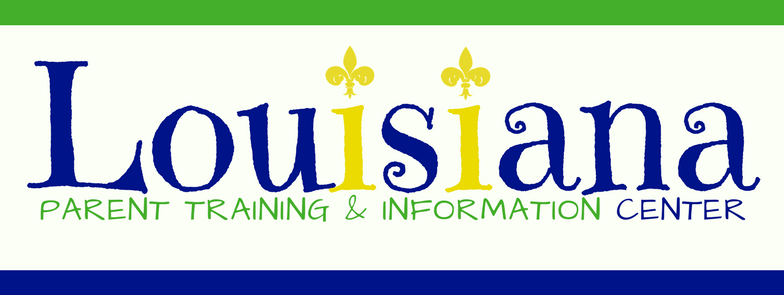
Louisiana Parent Training & Information Center
Families Helping Families of Greater New Orleans serves as the Louisiana Parent Training and Information Center and has been providing services to Louisiana families of children with disabilities, their teachers, and other professionals since 1991. Our staff is here to help you navigate the special education maze and equip you with the information and tools needed to be an informed and active participant in your child’s education. Louisiana’s Parent Training and Information Center (LaPTIC) is funded through the US Department of Education, Office of Special Education Programs.

A program of Families Helping Families of Greater New Orleans
FAQ about LaPTIC
What are PTIs?
A Parent Training and Information Center—or PTI— is a federally funded resource for parents of children with disabilities. Every state has at least one PTI depending on the overall population of the state. Louisiana has one PTI named Louisiana Parent Training and Information Center (LaPTIC). PTIs are funded through Part D of the Individuals with Disabilities Education Act (IDEA). The purpose of the PTI is to:
- teach parents of children with disabilities about their educational rights under The Individuals with Disabilities Education Act (IDEA); Section 504 of the Rehabilitation Act, Americans with Disabilities Act;
- provide parents with information about their child’s disability;
- teach youth and young adults about self-advocacy;
- provide resources in the community, state, and nation.
Louisiana Parent Training Parent and Information Center (LaPTIC) know about the needs of children and families. We understand school policies and practices. Through our experience with the education of children with disabilities, the needs of families and schools, we make valuable contributions on a local and statewide basis in support of schools to improve services and outcomes for students with disabilities.
What is the difference between LaPTIC and FHF?
LaPTIC is a federal grant to Families Helping Families of Greater New Orleans. Think about FHF as being the parent organization and LaPTIC is one of several funding sources that provide financial resources to FHF.
How is LaPTIC different from other places that provide support to parents?
When you call our office you can be assured you will be speaking to another parent that has a child with a disability and often have faced the same challenges as you. Through our own personal experiences, we are able to provide support in ways others that don’t have personal experiences can. Often parents want to talk to other parents that have been through similar situations. Our professional staff is here for you, always free of charge.
When would I call LaPTIC?
You might call us when you have a disability-related, early intervention, special education, or transition question. We can help you:
- understand your child’s disability and special needs;
- learn about the IDEA and what it means for your child;
- learn about the options, programs, services, and resources available to help your child and family;
- learn how to talk effectively to the people who work with your child;
- actively participate in making decisions about the services your child receives;
- work effectively with your child’s school to develop your child’s educational program;
understand the benefits of mediation for resolving disagreements with your child’s school; and - participate in school reform efforts on a local and/or statewide basis if you so choose.
In addition we also:
- provide information to teachers and other professionals who work with children with disabilities;
- help your child understand his or her rights upon reaching the age of majority; and
- help individuals and families explore future options, including transitioning to independent living, employment and education
How does LaPTIC help parents?
We mainly help parents by providing information on the phone, via email, through our website and now on social media. You have a question, we try to answer it. We may refer you to other helpful organizations in your community or offer practical advice. We employ well-trained and knowledgeable staff, all parents of children with disabilities. We answer the phone prepared to hear your concerns and issues. We are here for you – other parents and/or professionals that provide support to children with disabilities or suspected of having a disability.
Does LaPTIC help parents over the whole state?
Even though we do not have offices throughout the state of Louisiana – we provide support to parents statewide. In addition, we work with the Families Helping Families network to support their staff in supporting parents in their individual regions.
How does LaPTIC train parents?
LaPTIC provides over 100 opportunities annually to participate in a live workshop/training and/or webinars, and conferences on IDEA, other education laws and topics of interest to most parents of children with disabilities. In addition, we have recorded training in English and Spanish, and 20-minute mini-training available that parents can access 24/7 on our website listed under “training and events.”
Does LaPTIC provide support to students?
Part of LaPTIC grant is to provide support to youth and young adults with disabilities ages 16 to 26 to be effective self-advocates. We do this by providing training opportunities and peer-to-peer support through our youth information and training specialist.
What else does LaPTIC do?
In addition, our staff serves on different local and state-level advisory councils, boards, or workgroups that are designed to improve results for students with disabilities and enhance home-school-community partnerships.
What should I expect when I call for help?
As you know, dealing with many issues at one time can be overwhelming. An experienced staff member of LaPTIC can help you sort through the issues and put them in perspective. Together, we can brainstorm strategies and possible solutions. What questions need to be asked? Of whom? What information or training would be helpful? What does the law say? LaPTIC can help you address your unique concerns, and expand and build upon your knowledge and strengths. Our goal is to give you the knowledge, skills, and tools you need to be the best advocate you can be for your child.
Will LaPTIC go to school meetings with me?
With our limited resources we are unable to go to most school meetings. Our role is to give you the skills and confidence to negotiate for your child on your own or with the support of a natural support. This helps you get your child the services needed to reach his or her full potential. You will always be your child’s best advocate and we want to teach you how to effectively advocate for your child’s need. LaPTIC usually has a shortlist of priority IEP’s we might attend. You can always request we attend with you, but can never guarantee this support.
Will I have to pay LaPTIC for services?
All LaPTIC services are free of charge.
Will LaPTIC help me find resources to help my child?
Absolutely. Depending upon your needs, we usually:
- tell you about any upcoming workshops related to your son’s disability;
- help you develop your negotiation skills, so you’re sure his needs are addressed in his Individualized Education Program (IEP);
- put you in touch with available parent support groups;
recommend articles, books, videos, and organizations; - share information on resources and supports available from the school system, community, state, and national centers;
Will LaPTIC make referrals?
LaPTIC staff does not make referrals or recommendations of any professionals. We might tell you as an example, “we suggest you speak to an attorney” or “we think you should get an independent evaluation”, but we will never tell you to call a specific attorney or to go to a specific doctor, diagnostician or agency for an evaluation. We do have lists of people that do specific things – but in no way is this list considered recommendations or referrals. We recommend all parents to do their own research, ask in their own family and social network and collect enough information to make informed decisions.
We just moved to Louisiana. My child needs special education services. We have his old IEP with us. Can LaPTIC help us?
Sure, IDEA is a federal law that applies in all states. Even though most states have their own bulletins or regulations they use to implement IDEA – if your child qualified for special education services in one state, the chance is he will qualify in Louisiana too. We will probably share a lot of information with you and may talk a bit about the law. Both federal and state regulations have requirements for schools when a child moves into the state with an IEP from another state. We will want to make sure you understand what those requirements are. We will then direct you to the right school office.
What kind of questions will the LaPTIC staff ask?
In order to provide you with the best support, we do need to get a picture of your situation.
For example:
- Where do you live? (This will tell us what school district you’re in.)
- What are the dates on your child’s IEP? (This will tell the center if the IEP is current or not.)
- What kind of services is your child receiving? (This will tell us what types of services your son needs.)
- Because we are federally funded, we do need to ask for some demographic information for data collection. We will ask your name, address, contact information, email, phone number, ethnicity, and your child’s diagnosis. All this information is kept confidential and is only seen by LaPTIC staff. This information also allows us to set up an electronic file on you so we never have to ask you for this information again. We might occasionally reconfirm your information is still correct. This file will also allow us to keep notes on our conversations and meetings. This is important because we cannot guarantee every time you call you will speak to the same person. This file allows the staff supporting you, access to your information so you don’t have to repeat it all over again.
- We will probably ask you to send a copy of your most recent evaluation and last IEP.
- Do you want to be added to our mailing list? This will enable you to get our monthly e-newsletter, Exceptional Times, and stay up to date with all the training and events happening in Louisiana.)
Can LaPTIC help if my child is on a 504 plan?
Absolutely. If your child is receiving services through a 504 plan, we might ask for a copy.
Does my child have to have a specific disability or diagnosis for LaPTIC to help?
No, in fact – we will even provide support if you just suspect your child has a challenge.
What if I suspect my child’s IEP is not being followed?
There are several ways we can help you. First, we may invite you to one of our workshops on the special education law, IDEA. There, you’ll learn more about the rights of children with disabilities under the law. And you’ll gain more understanding on how the special education process is designed to work. This information will help you work with the school system. We may also recommend workshops that target areas such as:
- How to Develop Your Child’s IEP
- Collaborating with Your Child’s School
- How to Advocate for Your Child
What Do You Do When Home-School Communication Breaks Down?
We may offer to meet with you in person, by phone, or via video conference to discuss and review your child’s records. We can brainstorm options and make suggestions. We might give you ideas on how to talk to the school or how to write a letter asking for specific action. We will also give you options if you and the school cannot agree. And always, we will be there to provide you with follow-up support, information, and advice. Advocating for your child is a long-term commitment. We are here to help you and your child.
If I need help, what should I do?
Call our office at 504-888-9111 or 800-766-7736 or email us at info@fhfofgno.org.
The contents of this webpage were developed under a grant from the U.S. Department of Education, PR Award # H 328M200093. However, the content does not necessarily represent the policy of the U.S. Department of Education, and you should not assume endorsement by the Federal Government.
edited on 7/29/2024
